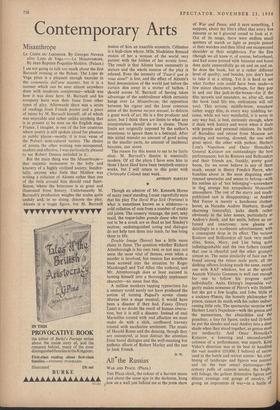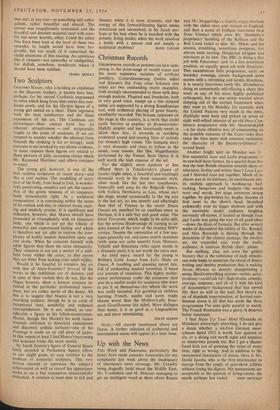All ° the Russias WAR AND PEACE. (Plaza.) THE Plaza clock,
the colour of a harvest moon and about the same size in the darkness, hung low on a wall just behind me at the press show of War and Peace, and it says something, I suppose, about the film's effect that every five minutes or so I glanced round to look at it. Out of its range, there were endless small sputters of match or light as people peered at their watches and then lifted one exasperated shoulder at their neighbours. For the film (though we all knew it, of course, beforehand, and had come primed with bananas and buns) does quite unmercifully go on and on and on. So does the book, but at a rather different level of quality; and besides, you don't have to take it at a sitting. Yet it is hard to see what further cuts could have been made—a few minor characters, perhaps, for they pop in and out like jack-in-the-boxes—for if the film sprawls and meanders, so, after all, does the book (and life too, enthusiasts will tell you). This serious, middle-brow, somehow rather soggy film, in every way middling be- cause, while not very wonderful, it is never in any way bad, is best, curiously enough, when it deals with history and worst when it deals with people and personal relations. Its battle of Borodino and retreat from Moscow are exciting and moving, directed, the one with great spirit, the other with pathos; Herbert Lom's Napoleon and Oscar Homolka's General Kutuzov are outstandingly the best performances; but its Rostovs and Bolkonskys and their friends are, frankly, pretty good bores, for we never believe in any of them much, except in Henry Fonda's Pierre, who bumbles about in the most disguising steel- rimmed spectacles and seems to belong—with his restless air of 'not belonging'—somewhere in that strange but sympathetic Muscovite atmosphere. The rest of the starry and much- publicised cast is disappointing: as Andrey Mel Ferrer is merely a handsome clothes- horse; as. Natasha Audrey Hepburn, though charming (naturally), lacks depth rather obviously in the later scenes, particularly at Andrey's death, and her smile, before so un- forced and unactressy, now gleams as dazzlingly as a toothpaste advertisement, with a consequent drop in its effect. The various Rostovs and Bolkonskys all look very much alike, Sonia, Mary, and Lise being quite indistinguishable and the two fathers (except that one is cheerful and the other grumpy) almost so. The same similarity of face can be found among the minor male parts, all the dashing officers looking much the same, except one with RAF whiskers, but as the spivish Anatole Vittorio Gassman is well cast enough for one to follow his progress more individually. Anita Ekberg's impossible vul- garity makes nonsense of Pierre's wife Helene, but she got a few laughs, and John Mills as a cockney ,Platon, the homely philosopher in prison, cannot do much, with his rather embar- rassing little role. The spectacular surprise was Herbert Lom's Napoleon—with the genius and the mannerisms, the absurdities and the grandeur, a tiny fat figure, cocky and ill-bred, he put the slender and easy Andrey into a deep shade when they stood together, as genius must put mediocrity. And Oscar Homolka's Kutuzov, a lowering and uncomfortable colossus of a performance, was superb. King Vidor's direction was at its best in handling the vast number (10,000, I believe) of extras used in the battle and retreat scenes: his com- bining of landscape and figures was pointed and (in the best sense) picturesque--:the cottony puffs of cannon smoke, the bright, soft foliage, the gallant diminutive figures and, distant comings and goings of cavalry, all giving an impression of war—in a battle of . that sort, at any rate—as something still rather gallant, rather beautiful and absurd. The retreat was magnificently contrasted and the dreadful and desolate material used with pain- ful, but never horrific, effect. Could the entire film have been kept at the level of these two episodes, its length would have been for- givable, but too much of it concerned the cliche situations of film making. An ambitious lilm it remains—not unworthy or undignified. but dullish, somehow; ponderous where it should have been sublime.
ISABEL QUIOLY











































































 Previous page
Previous page